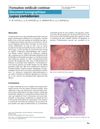April 2023 in “Journal of Investigative Dermatology” CD8+ T cells attack hair follicle stem cells, causing scarring and hair loss.

Recent discoveries have improved our understanding of hair loss, but challenges in treatment and knowledge among specialists still exist.
 127 citations,
January 2015 in “Journal of Biological Rhythms”
127 citations,
January 2015 in “Journal of Biological Rhythms” The skin's internal clock affects healing, cancer risk, aging, immunity, and hair growth, and disruptions can harm skin health.
 84 citations,
March 2004 in “Veterinary Dermatology”
84 citations,
March 2004 in “Veterinary Dermatology” Cyclosporin is effective in treating dog skin diseases and has fewer side effects compared to other treatments.
56 citations,
October 2016 in “Journal of dermatological science” New insights into the causes and treatments for the autoimmune hair loss condition Alopecia areata have been made.
48 citations,
May 2018 in “Expert Opinion on Therapeutic Targets” Gut health may influence Alopecia Areata, suggesting new treatments.
22 citations,
September 2019 in “Trends in Immunology” Acne is a temporary skin imbalance during puberty that often resolves on its own.
 15 citations,
April 2003 in “Journal of dermatology”
15 citations,
April 2003 in “Journal of dermatology” Alopecia areata causes hair loss due to an immune attack on hair follicles, influenced by genetics and environment.
 5 citations,
November 2011 in “Expert Review of Dermatology”
5 citations,
November 2011 in “Expert Review of Dermatology” The document concludes that early diagnosis and a comprehensive treatment plan are crucial for managing hair loss in children, with a focus on both medical and psychological support.
3 citations,
September 2021 in “BioEssays” Dandruff might be caused by changes in how hair follicles naturally release oils and an immune response to this imbalance.
 1 citations,
October 2020 in “Journal of The American Academy of Dermatology”
1 citations,
October 2020 in “Journal of The American Academy of Dermatology” Balding might help identify men at higher risk for severe COVID-19, but more research is needed.
 1 citations,
January 2012 in “Elsevier eBooks”
1 citations,
January 2012 in “Elsevier eBooks” The document concludes that the skin is a complex organ providing protection, sensation, and healing, with challenges in treating conditions like itchiness.
 November 2022 in “The journal of investigative dermatology/Journal of investigative dermatology”
November 2022 in “The journal of investigative dermatology/Journal of investigative dermatology” The study suggests a link between varicella-zoster virus and segmental vitiligo, with evidence of the virus disrupting skin pigment cells.
 6 citations,
January 2015 in “Journal of regenerative medicine & tissue engineering”
6 citations,
January 2015 in “Journal of regenerative medicine & tissue engineering” The review concludes that innovations in regenerative medicine, tissue engineering, and developmental biology are essential for effective tissue repair and organ transplants.
365 citations,
November 2018 in “Journal of Allergy and Clinical Immunology” People with atopic dermatitis have different skin bacteria, and targeting these bacteria might help treat the condition.
 35 citations,
January 1993 in “International Journal of Dermatology”
35 citations,
January 1993 in “International Journal of Dermatology” People with HIV and low T cell counts have more hair and scalp problems.
717 citations,
June 2010 in “Nature” Alopecia areata involves both innate and adaptive immunity, with specific genes linked to the disease.
11 citations,
October 2021 in “Orphanet journal of rare diseases” Patients with RASopathies are at risk for autoimmune disorders and should be routinely screened.
6 citations,
May 2013 in “The Journal of Dermatology” Autoimmune reactions may cause both alopecia areata and HAM.
 2 citations,
August 2017 in “British Journal of Dermatology”
2 citations,
August 2017 in “British Journal of Dermatology” Hair loss in Cronkhite-Canada syndrome may be due to an autoimmune response.
 January 2025 in “bioRxiv (Cold Spring Harbor Laboratory)”
January 2025 in “bioRxiv (Cold Spring Harbor Laboratory)” Potential therapeutic targets for scarring hair loss are identified.
 290 citations,
December 2017 in “Journal of The American Academy of Dermatology”
290 citations,
December 2017 in “Journal of The American Academy of Dermatology” Alopecia areata is an autoimmune condition causing hair loss, influenced by genetics, stress, and diet, and may be prevented by a high soy oil diet.
 7 citations,
October 2013 in “British Journal of Dermatology”
7 citations,
October 2013 in “British Journal of Dermatology” HIV can cause skin disorders, which are often the first sign of infection, especially in people with darker skin.
 7 citations,
November 2007 in “Annales de Dermatologie et de Vénéréologie”
7 citations,
November 2007 in “Annales de Dermatologie et de Vénéréologie” A man was diagnosed with a rare form of lupus after showing unique skin symptoms that responded well to treatment.
69 citations,
February 2008 in “The American journal of pathology” Controlled delivery of specific RNA and IL-4 restored hair growth in mice with autoimmune alopecia.
 23 citations,
June 2003 in “Journal of Investigative Dermatology Symposium Proceedings”
23 citations,
June 2003 in “Journal of Investigative Dermatology Symposium Proceedings” Alopecia Areata is an autoimmune disease affecting hair follicles, influenced by genetic and environmental factors, with rodent models being essential for research.
 23 citations,
July 1982 in “International Journal of Dermatology”
23 citations,
July 1982 in “International Journal of Dermatology” The review concludes that accurate diagnosis of different types of hair loss requires proper biopsy techniques and understanding the hair growth cycle and underlying causes.
22 citations,
January 2009 in “Advances in experimental medicine and biology” FOXN1 mutations cause severe immunodeficiency, hair loss, nail issues, and thymus defects.
5 citations,
October 2012 in “Veterinary Pathology” A Doberman Pinscher had a rare form of autoimmune disease causing hair loss and other severe symptoms.
 August 2023 in “Medical Hypotheses”
August 2023 in “Medical Hypotheses” Metformin, usually used for diabetes, can also help treat hair loss from alopecia areata due to its ability to reduce inflammation and stimulate new hair growth.

















